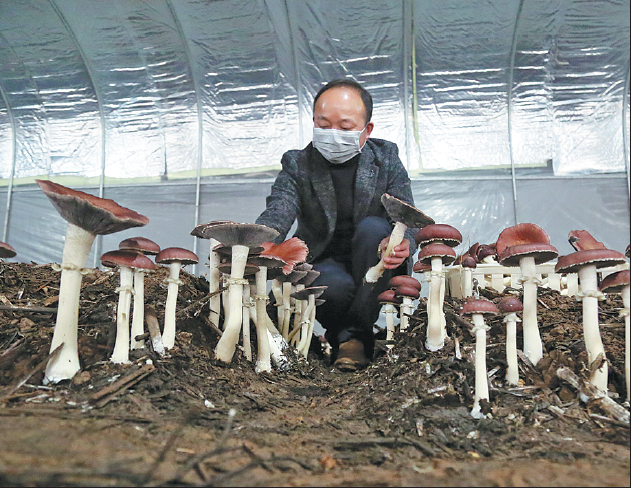Prosperity mushrooms on reeds in central China
In August 2019, the local government in Yuanjiang proposed the idea of growing mushrooms using fermented reeds.
By the vast Yanzhi Lake, villagers cut the roots of mushrooms and put them into sorted baskets in preparation for sale.
These mushrooms are nothing out of the ordinary, yet they grow out of something special: fermented reeds.

The lake is located in the city of Yuanjiang, central China's Hunan province. The city is next to the Dongting Lake, China's second-largest freshwater lake. Thanks to rich water resources, the city is home to huge areas of reeds.
In the past, reeds were used to manufacture paper, and paper-making was once a major industry in the city. However, paper-making pollution saw the industry shut down in Yuanjiang in late 2018.
To dispose of the huge number of reeds, the local government came up with a novel idea: to turn them into the base materials for mushroom growth.
This year, about 30,000 tonnes of reed mushrooms will be turned out, the government said.
"Reeds contain about 15 amino acids, and are perfect for mushroom cultivation," said Yang Xiangguang, who heads a mushroom-making company in Yuanjiang.
Paper-making pollution
The abundance of reeds in Yuanjiang once gave rise to a sprawling paper-making industry.
According to official figures, Yuanjiang produces about 370,000 tonnes of reeds each year, accounting for about 50 percent of all reed production around the Dongting Lake.
Since the 1970s, paper-making from reeds was one of the biggest industries in the city. The industry was so powerful that it allowed Yuanjiang to become one of the top 10 county-level economies in Hunan province in the 1990s.
But paper-making took its toll on the environment.
Paper-making required many chemicals. Wastewater discharged into rivers and lakes without proper treatment can cause underwater animals such as fish and shellfish to die because of anoxia. The small particles in the water can block the gills of fish and cause them to die too. The wastewater also blackens water and threatens local people's health.
To protect the environment of the Dongting Lake, local authorities phased out paper-making production in Yuanjiang completely in December 2018, as the country enhanced the protection of the Yangtze River Economic Belt.
The water of the Dongting Lake flows into the Yangtze, China's longest waterway.
But how to dispose of the excess reeds became a pressing issue.
Mushrooming business on reeds
In August 2019, the local government in Yuanjiang proposed the idea of growing mushrooms using fermented reeds.
"Reeds were once a source of prosperity, but it later became a burden for us," said Huang Yuwen, secretary of the Yuanjiang City Committee of the Communist Party of China. "We decided to turn the burden into prosperity again, but in an environmentally friendly way."
Local authorities pooled resources and capital, and invited agricultural experts to teach locals how to grow mushrooms on the reed bases.
With the support of the government, the industry began to take shape.
Currently, Yuanjiang has eight enterprises and seven rural cooperatives focusing on reed mushroom cultivation, with more than 20 hectares of mushrooms already planted.
Yang Xiangguang's company is located in Yuanjiang's Gonghua township. His mushroom plantation covers an area of seven hectares. Yang plans to invest a total of 50 million yuan (about US$7.2 million) by the end of this year.
"I have conducted research with experts of Guangxi University for years and we have the most unique technology," Yang said.
Gonghua township can churn out about 22,000 tonnes of reeds annually. Local authorities have introduced several reed mushroom-making companies, including Yang's.
Yang's company has generated job opportunities in the locality, employing more than 1,000 farmers.
Yang is also looking at turning used reed bases into natural cellulose.
"After picking up the mushroom strains from the reed bases, what is left is natural fiber," he said. "Typically, natural fiber is quite expensive, because it is very difficult to extract. But as the mushrooms absorb nutrients from the bases, they easily become natural fiber."
Support for the reed mushroom industry is rising. The city government is currently asking the public to come up with advertising slogans to promote the Yuanjiang reed mushrooms. The slogans need to be concise, creative and representative of the unique mushrooms, with the winning entries receiving awards, the government said.
By 2022, Yuanjiang will be able to produce 200,000 tonnes of mushrooms from the reed bases and dispose of 300,000 tonnes of reeds each year, according to the city government. The industry is expected to generate 16,800 jobs, and its production value will reach 10 billion yuan.
"I am confident in the market of Yuanjiang's reed mushrooms," Yang Xiangguang said.

